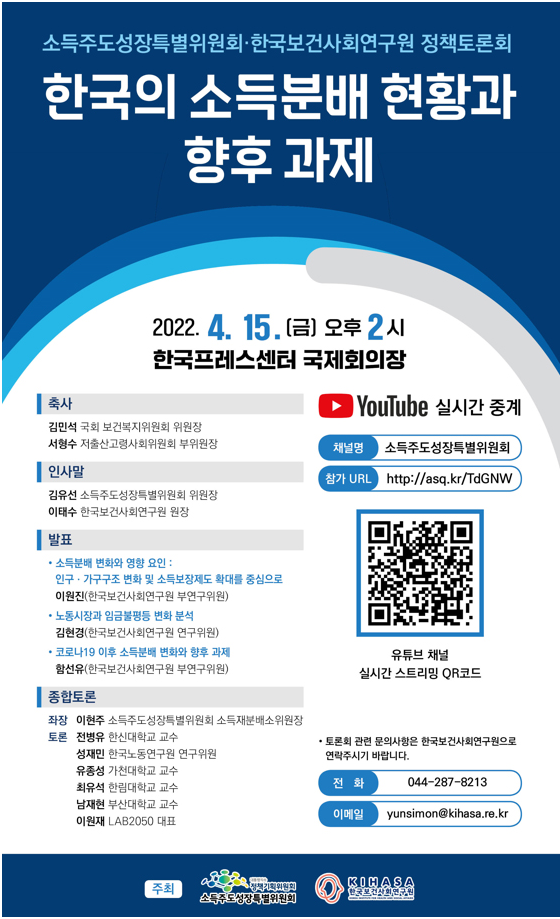Press Release
Policy Discussion: Current Income Distribution in Korea and Its Implications
- Date 2022-04-22
- Hits 806
The Korea Institute for Health and Social Affairs (KIHASA) and the Special Committee on Income-led Growth (SCIG) jointly held a policy discussion on current income distribution in Korea and its implications on Friday, April 15 at 2:00 p.m. The topics discussed at this forum include changes in population and family structures, changes in the labor market, trends in income distribution in Korea in the changing policy environment such as the prolonging of the pandemic, and their policy implications.
Lee Tae Soo, president of KIHASA, said, "Today's discussion is timely as it focuses on the effects of demographic changes on income distribution, the effects of labor market changes on income inequality, and Korea's income inequalities and people who have been marginalized by the covid-19 pandemic," adding, "KIHASA will contiue to make contribution to resolving income inequality with scientific and bias-free research and by making policy suggestions."
Kim Yoo Seon, chairman of the SCIG, said, "Though we have seen some improvements in income distribution indicators--a decline in the proportion of low-wage workers, improvements in earned income share and the Gini coefficient--, we need to further strengthen our social security programs in the face of rapid socioeconomic changes. I hope this discussion will be an opportunity to explore ways to develop our social security system further based on the scientific and rigorous examination of Korea's current income distribution."
Lawmaker and National Assembly Health and Welfare Committee Chairman Kim Min Seok said, "Employment patterns are changing fast due to low fertility, population aging, covid-19, the 4th industrial revolution, and the emergence of platform industry. So it is high time we worked together to enhance job and income securities for our workers by building up a flexible risk response system to such social risks as poverty and unemployment. I hope today's discussion will serve as an opportunity to push our society a step forward to resolving polarization and promoting people's happiness."
Seo Hyung Soo, vice chairman of the Low Fertility and Aging Society Committee, said, "To get out of the wretchedness of our society's low birth rate, we should narrow the gap in our society, the gap between companies providing jobs, and the gaps in wages and working conditions among workers. We need a serious discussion on and pay keen attention to income gaps and distribution in order to solve low-fertility problems."


